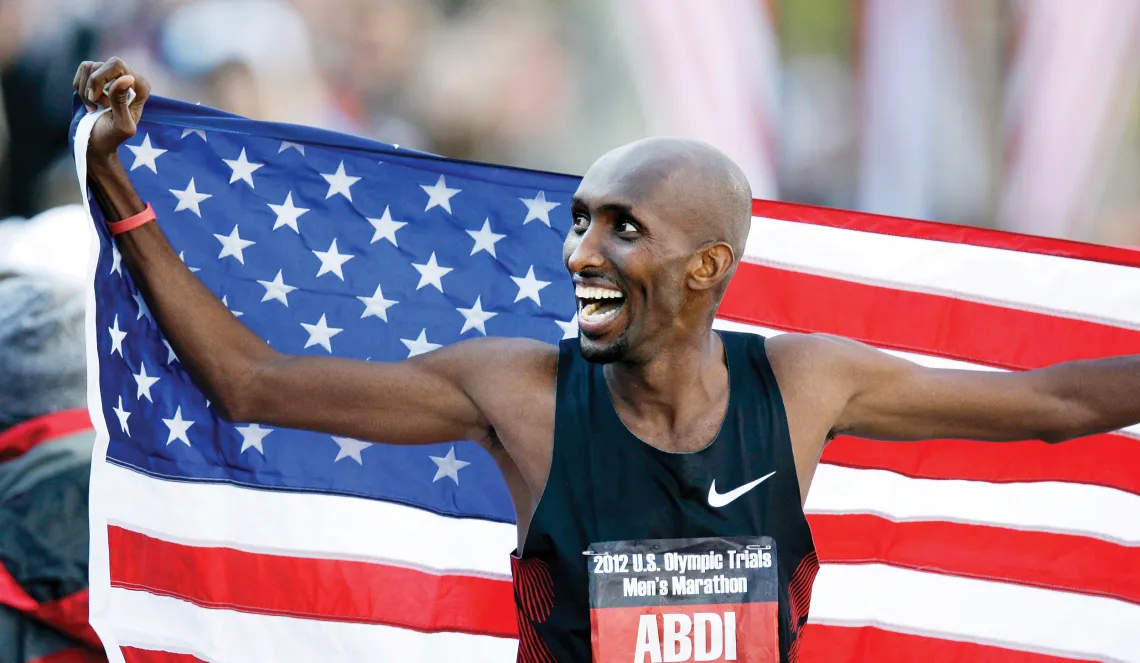Long Distance Love

Photo: Abdi Abdirahman celebrates after finishing third in the U.S. Olympic Trials Marathon on Jan. 14, 2012, in Houston. David J. Phillip/Associated Press
The first time Abdi Abdirahman ran with a track team, he was wearing boots. Not the athletic gear you’d expect of a future star — but, then, Abdirahman’s story is anything but typical.
He and his family came to the United States as refugees in 1990, fleeing the Somali civil war. Six years later, he was attending Pima Community College when a friend suggested that he try running.
The next day, he approached Pima’s cross-country coach.
“He asked me if I’d ever run before,” Abdirahman recalls. “I said, ‘No.’ But I ran with those kids for five miles, and I came in second — wearing my jeans and Rockport boots.”
Around that time, acclaimed UA cross-country coach Dave Murray started noticing a skinny kid dashing through the hills west of town. A light went off. “The best runners in the world are from Africa — Kenya, Ethiopia, Somalia,” Murray says. “There is a grace in their running that’s just beautiful. I started talking to him and said, ‘Hey, why don’t you come to the UA?’”
Murray concedes that Abdirahman’s times back then were nothing spectacular and that he had to convince his associate coaches to trust his hunch. “They thought I was crazy,” he says. “I had offered Abdi a scholarship. That was unheard of at the UA’s level of competition.”
Abdirahman knew it was the chance of a lifetime. “A lot of schools didn’t think I was good enough for a scholarship,” he says. “But Coach Murray took a risk with me, and it paid off.”
That’s an understatement. While at the UA, Abdirahman won his first two big races, the Aztec and Jammin’ invitationals, and he placed second in the NCAA Cross Country Championships. He was named All American by the U.S. Collegiate Athletic Association. In 1998 alone, he won the 5,000- and 10,000-meter races in the Pac-10 Collegiate Championships and was named Cross Country Athlete of the Year.
“He’s undoubtedly the best male distance runner we’ve ever had at the UA — and we’ve had many of them,” Murray says.
That was just the beginning of a long and remarkable career — one that has included four trips to the Olympics and an equal number of USA Track and Field championships.
At age 40, when many runners have already hung up their shoes, Abdirahman remains among the world’s leading long-distance runners. “Age is just a number for me,” he told competitor.com. “I don’t look at my age as a disadvantage. I look at it as an advantage, because I have experience and I have been here before.”
That sophistication shows in races like the Boston Marathon, where he recently placed sixth. A race like Boston can be a strategic masterpiece — or 26.2 miles of misery. “A marathon is sort of half-sprinting,” Abdirahman says. “You want to run fast, but at the same time you want to know your limit — what you’re capable of. In a marathon, you can’t run too fast, and at the same time you can’t run too slow. You just have to figure it out.”
In other words, if you don’t run smart, you run into a wall. Abdirahman knows exactly how that feels. In his first marathon, in New York City in 2004, he admits that he didn’t know how to make the transition from track running to the longer distance. “I thought the people I was pacing with were running too slow, so I just picked it up. By the time I got halfway, I was dead. I didn’t have anything left. I finished but I was barely running.”
These days, Abdirahman runs up to 130 miles a week, training in Tucson during the winter and Flagstaff in the summer. Dave Murray, now retired from the UA, remains his coach. “I’ve been working with Abdi so long that he’s really part of our family,” Murray says.
James Li, a UA track coach who works informally with Abdirahman, describes the runner’s determination and technical skill as key to his enduring career. “He really is the exception, remaining one of top runners in the country,” Li says. “Not only that, but he’s been at the top since the early 2000s. It says so much about his talent but also his education as a runner. It takes focus and education to maintain at that level. Talent alone won’t do it.”
For Abdirahman, it’s mostly about following his heart. “I just love running,” he says. “It’s a passion. I think if I didn’t love running I would not have lasted as long as I’ve lasted. I don’t have to work at a job. I just work at something that I love to do.”
What Abdi Eats
Although Abdirahman hails from Somalia, his tastes in food are “pretty Americanized,” says Coach Murray. “He doesn’t adhere to a very strict diet.”
That means cheeseburgers, french fries and the occasional beer.
But while the runner hardly lives a monastic existence, things do tighten up when he gets closer to a race. “If he’s running a half-marathon or a marathon, early the week before he’ll have a high-protein diet,” says Murray. “And then the last three or four days before the actual competition he’ll go off the protein and onto very high carbohydrates. And he’ll stay away from junk foods and sodas and things of that nature.”
